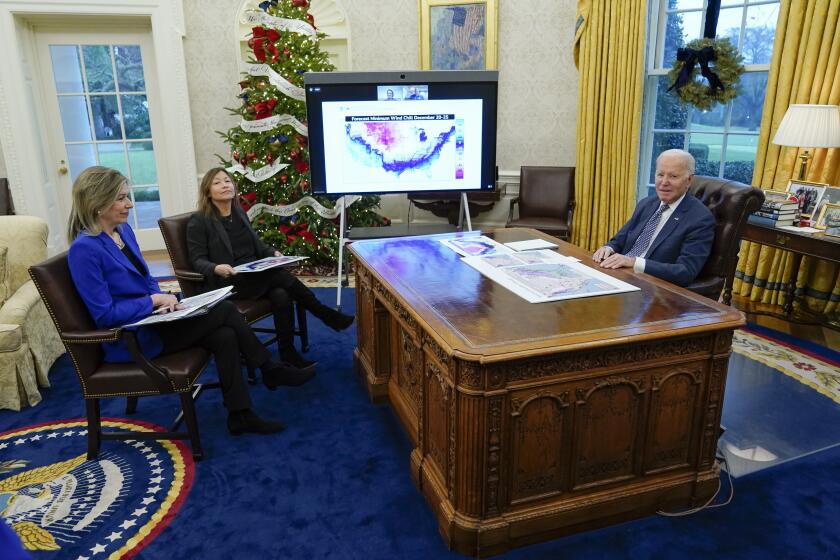Bush Finds Senate Tough Going
While President Bush tries to make headway on the battlefields of Iraq, he is on a losing streak back home in Congress.
The Senate, although controlled by Republicans, has blocked a marquee judicial nomination, rejected a major element of Bush’s energy policy and voted to gut the tax cut that is the foundation of his economic policy.
Bush’s ability to get his way in the narrowly divided chamber has been hampered by uncharacteristic unity among Democrats -- including moderates who backed Bush’s 2001 tax cut -- and their willingness to stand up to the president despite the surge in support for him among voters once the war started in Iraq.
The hard-fought domestic policy debates also have shown how difficult it is for Bush to keep even his own party in line without a big investment of his personal political capital -- a commodity in short supply while he is absorbed with the war.
“He is the most persuasive of salesmen, and it’s very hard to say no to the president,” said Sen. Susan Collins of Maine, a moderate Republican who has occasionally strayed from the White House line. “The fact that he necessarily is focused on the war does have an impact.”
That means Bush’s status as a wartime president is a double-edged sword when it comes to domestic policy.
“Whatever he gains from being at war and people rallying around him is diminished by the fact he personally isn’t as involved,” said Sen. Rick Santorum of Pennsylvania, a member of the GOP leadership.
Senate Republicans, with an eye to giving Bush a fresh domestic policy victory, hope soon to bring up his initiative to increase federal help for “faith-based” charities. But to overcome Democratic opposition, the GOP has had to strip the bill of key features of Bush’s original plan.
Bush’s other big test will be how hard he will fight to keep Democrats from turning his emergency war-funding request into a spending spree on homeland security and other domestic concerns.
Once the war is over, Bush likely will have to be more persuasive in dealing with Senate Democrats and moderate Republicans if he wants to prevail on other elements of his ambitious domestic agenda -- from his tax cut to squabbles yet to come on Medicare reform and domestic spending restraints.
“As soon as we take Baghdad, the spotlight shifts to the economy and his domestic agenda,” said James Thurber, director of the Center for Congressional and Presidential Studies at American University in Washington. “His popularity with respect to this war is not translating to domestic policy, and that shows what’s in store for him when this war ends.”
War or no war, Bush would be facing tough fights in the Senate, with its breakdown of 51 Republicans, 48 Democrats and one independent. So even if Bush had been more involved in lobbying, he might not have been able to thwart recent Senate votes to slash his $725-billion tax cut to $350 billion, block drilling in Alaska’s Arctic National Wildlife Refuge or overcome the filibuster of his nomination of Miguel A. Estrada to the U.S. Court of Appeals for the District of Columbia.
Holding Together
In some instances, Democrats need do little more than stick together to beat Bush. It takes 60 votes, for instance, to overcome the Estrada filibuster. But party unity is not easy to come by in the often-fractious Democratic caucus.
To keep Democrats together on the Estrada nomination, Senate Minority Leader Tom Daschle of South Dakota had to overcome some qualms that employing rarely used obstructionist tactics could come back to haunt the party when one of its own is in the White House making judicial appointments.
It was also a struggle to get his colleagues -- minus only Sen. Zell Miller of Georgia -- to vote for a $350-billion tax cut because, for many liberals, that was still far too big a reduction.
“We had to work at it,” Daschle said. “But there’s a real consensus among our caucus that if we’re going to be effective, we have to be unified.”
The administration’s ability to peel off Democrats has been hurt by embittered feelings among moderates who the White House had hoped would be Bush allies. Moderate Democrats provided the crucial votes for Bush’s 2001 tax cut -- and felt betrayed when he and his allies campaigned against many of them in 2002.
“Why would any moderate go out of the way to work with this administration?” asked Sen. Mary Landrieu (D-La.), who after backing the 2001 tax cut won reelection despite strong support from the White House for her opponent. “If their goal is to alienate every Democrat who could possibly work with them on anything, then they are doing a good job.”
Sen. Ben Nelson (D-Neb.), another moderate, this year indicated willingness to support Bush’s $725-billion tax cut proposal. But he became infuriated when the White House instructed Republican businessmen in his home state to personally urge him to support it.
“My preference would be for them to work with me, not on me,” said Nelson, who made the point to the White House’s chief lobbyist, David Hobbs.
But Bush’s problems in the Senate stem not just from obstreperous Democrats. There is also a lack of party discipline among Republicans.
“The problem is less at the White House than it is here,” said Sen. Trent Lott of Mississippi, who stepped down as GOP leader in December under fire for racially tinged remarks. “We’re the ones who cast the vote.”
The battles over domestic policy have amounted to trial by fire for the Senate’s rookie Republican leadership team, headed by Sen. Bill Frist of Tennessee. So far, lack of GOP unity has led to several defeats for Bush -- eight Republicans crossed party lines to vote against the administration on Arctic oil drilling; three voted for the reduced tax cut.
Vice President Dick Cheney helped lobby for the oil drilling, and the White House case seemed to be bolstered by the recent surge in gasoline prices and the imminent start of a war underscoring U.S. dependence on foreign oil production.
But Republicans who voted against the drilling included Sen. Norm Coleman of Minnesota, a freshman who owes much to Bush for his personal support last year. As a candidate, Coleman pledged to oppose the Arctic drilling, but during the Senate debate he showed some willingness to switch positions. Despite that, he said he did not feel much pressure to side with the president. “I didn’t get worked over on that,” Coleman said.
Lobbying by Cabinet
“I don’t think [Bush] put that much into that particular vote,” said Landrieu, one of five Democrats from oil-producing states who voted for the Arctic drilling.
She added: “If they can’t push [drilling] now, I don’t know what they can get through.”
Cabinet members joined the lobbying against the push to reduce Bush’s tax cut proposal; that helped win Collins’ support. But Senate Finance Committee Chairman Charles E. Grassley (R-Iowa) said Bush himself would have to weigh in to reel in the three GOP defectors in future votes -- Sens. Lincoln Chafee of Rhode Island, Olympia J. Snowe of Maine and George Voinovich of Ohio.
“That’s putting a lot on the president’s shoulders, but the president can help,” Grassley said.
The new version of Bush’s faith-based charity initiative demonstrates the hurdles his domestic agenda must clear to become law. The original plan languished because of Democratic objections to several provisions aimed at helping religious groups compete for government grants. A major complaint was that the bill would not sufficiently restrict religious teaching as these groups performed charitable work.
Santorum wants to break the deadlock by dropping the bill’s most controversial provisions. Barry W. Lynn, who as head of Americans United for Separation of Church and State has been a vocal foe of the Bush proposal, hailed the proposed compromise as “a huge step in the right direction.”
More to Read
Get the L.A. Times Politics newsletter
Deeply reported insights into legislation, politics and policy from Sacramento, Washington and beyond. In your inbox three times per week.
You may occasionally receive promotional content from the Los Angeles Times.











